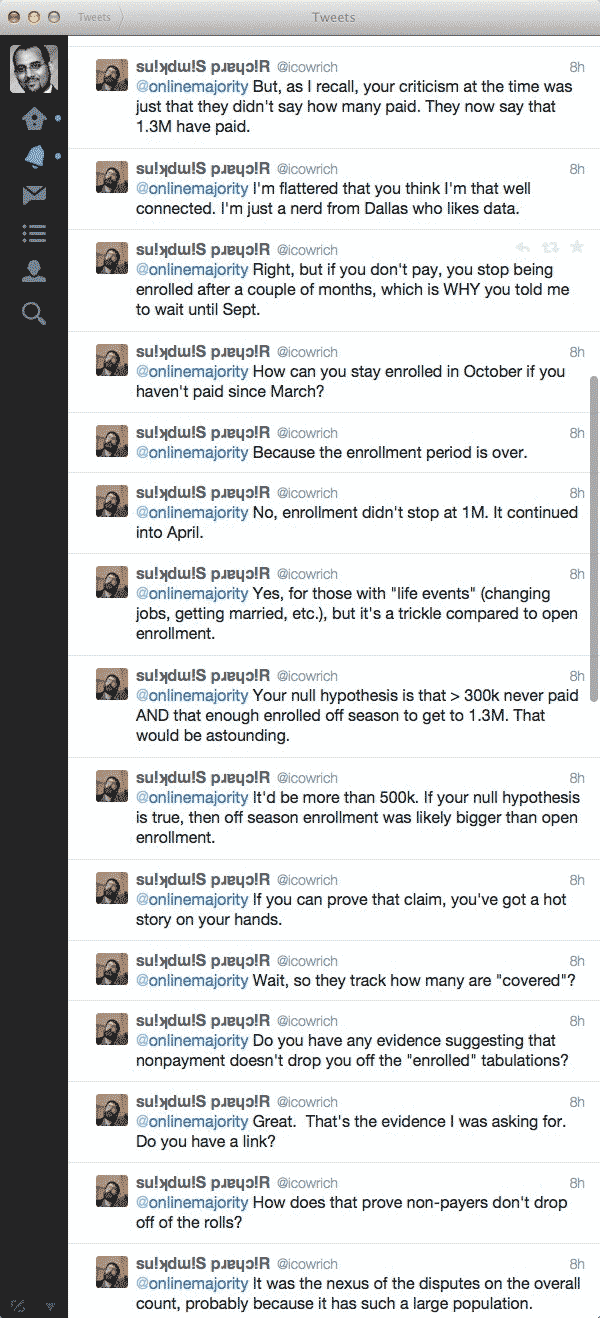Sunday Funnies: The best one-sided conversation I've ever read
Let's fire up the Wayback Machine® and revisit March 19, 2014, shall we?
Don't Feed the Trolls: A Special Entry for a Special Visitor
...A few days ago, I broke the cardinal rule of blogging and social media: I fed a troll. Specifically, I engaged in a back & forth with a guy who insisted that I don't have any clue what I'm talking about, that I "don't cite my sources" (insane, since every one of my sources is meticulously cited, dated and linked to)...and, in particular, that I'm "lying" about the number of California residents who have "fully" enrolled in exchange-based QHPs in California (and by extension, nationally). If you check the recent Disqus comments you'll see him pop up a few times today.
At first, he was arguing the "But how many have PAID???" line, which I've repeatedly addressed.
Interestingly, he was finally willing to (grudgingly) concede that yes, around 85% of "full enrollments" have indeed been paid to date.
However, he still insisted that the number of "full" enrollments only "counts" if the policy has actually been issued:
@charles_gaba @icowrich 85% of issued policies may be paid, but doe ABCC verify coveredCA's 268K policies selected are issued... Nope
— Michael (@onlinemajority) March 17, 2014
Now, he provided exactly no evidence that this is the case. He cited no report, no news article, no interview; he just insisted that the 85% only applies to some non-specific-but-presumably-much-smaller number of issued policies, not to the actual number enrolled in.
...and so on and so forth. The bottom line is that this guy was absolutely adamant that there was no possible way that 85% of the total enrollees reported by CoveredCA (1 million at the time, 1.4 million by the end of the open enrollment period) had actually paid their first month's premium. He insisted that this was fuzzy math, a shell game, accounting tricks, etc. He didn't believe it, therefore, it simply couldn't be.
Anyway, he runs his own blog called "Online Majority" in which he purported to have "unskewed" my data, somehow "proving" that he was right. This in turn was used in the only true "hit piece" I've received from the closest thing to a well-known right-wing outlet (although I'm not sure NewsBusters counts as "well-known").
Of course, it turned out that I was correct: Not only did the 85% paid number reported by CoveredCA director Peter Lee at the time indeed refer to the total enrollments (850K out of 1 million as of 3/19; 1.2 million out of 1.4 million as of 4/27), but just last week they confirmed that there's 1.3 million Californians currently enrolled (& therefore paying) in exchange QHPs as of now.
In any event, back in March, "Michael" and I took a few more shots at each other via Twitter. He kept throwing personal insults into the mix, and I started to get swamped with the big late-March/early-April enrollment spike, so I finally blocked him and pretty much forgot about the guy...until last night.
Last night, @icowrich (the other guy referred to in Michael's original tweet above, and a regular commenter here at ACA Signups), who didn't forget, decided to follow up with him regarding his "no way CA hit a million paid" claim from March.
Twitter conversations are, by the very nature of the 140-character limit and the constant weaving in & out of threads, quite disjointed. They become even moreso when you only have access to one side of the conversation. Since I have Michael blocked, I can't see his responses...but as you can see, I don't really need to (note that due to the length of the conversation, I've posted it via screenshots):



It continues from there for awhile, but it's fascinating how easy it is to fill in the other side of the discussion, isn't it?
Anyway, thanks to Icowrich for both following up on this detail (as I said, I had long since forgotten about this particular incident in the midst of the craziness which followed) as well as for confirming that 6 months later, this guy is still full of hooey and still clearly has anger management issues.



